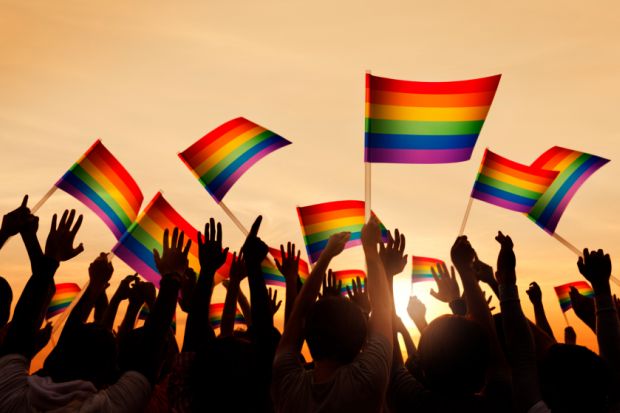What is it like to be an LGBT academic, in the UK and beyond? To answer that question we decided to ask six people – including one of England’s only “out” vice-chancellors, a transgender woman and two scholars who pioneered the study of “queer” themes – to describe their experiences, the hostility they had faced, the changes they had witnessed and where universities still need to do more. Their eloquent testimonies are published as the lead feature in this week’s issue.
While we were obviously keen to have a variety of perspectives, we wanted to know whether the highly positive picture some have painted – with 12 universities now listed among the UK’s 100 most inclusive employers in the latest list compiled by the LGBT rights charity, Stonewall – rang true. I recalled a fascinating interview I once did with Sharif Mowlabocus, senior lecturer in media studies/digital media at the University of Sussex, about his book Gaydar Culture: Gay Men, Technology and Embodiment in the Digital Age. This explored both what he called “the mainstream gay middle-class culture represented in films and on television”, but also “forms of behaviour that cause anxiety even within this ‘mainstream’ gay community, never mind the Daily Mail”.
While Mowlabocus told me he “totally support[ed] civil partnerships as a move towards civil rights for gays” and would presumably now feel the same way about the 2013 Marriage (Same Sex Couples) Act, he also pointed to “worries about the dangers of assimilating to more widespread norms. Some people will want to rebel against them or feel that they don’t fit in with the way they live, so there are costs as well as very genuine benefits.” Would some of our contributors take the view that increasing acceptance of gay perspectives and individuals within the academy also had a downside?
In the event, most take the view that the climate in British universities today, and particularly compared with other times, places and sectors, is reasonably benign. Several recall the terrible atmosphere at the time of the Aids crisis. Others chart the way that initially derided “queer” topics have become widely accepted within the humanities.
Yet, alongside all this good news, there is clearly no room for complacency. The feature reports some striking examples of mild (and sometimes not so mild) homophobia. One contributor asks whether some disciplines, and the sectors of the economy to which they are linked, are less accepting of “out” gay academics and professionals than others. Another offers a striking list of ways that universities are still falling short for their LGBT staff, in terms of curricula, welfare and even failing to recognise the sheer time and energy that many gay academics devote to acting as role models for their students. Still more significant is the account by a transgender woman who has suffered great distress from colleagues who are “unsure about how to interact with [her] post-transition and keep their distance”.
If much has been achieved, it is clear that much still remains to be done.
Register to continue
Why register?
- Registration is free and only takes a moment
- Once registered, you can read 3 articles a month
- Sign up for our newsletter
Subscribe
Or subscribe for unlimited access to:
- Unlimited access to news, views, insights & reviews
- Digital editions
- Digital access to THE’s university and college rankings analysis
Already registered or a current subscriber?




